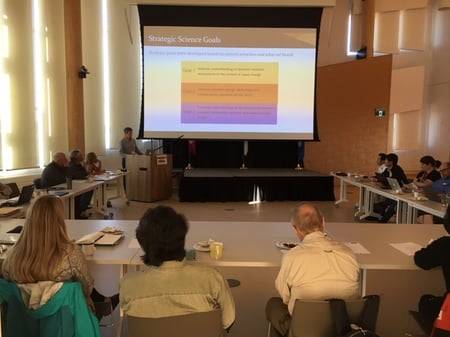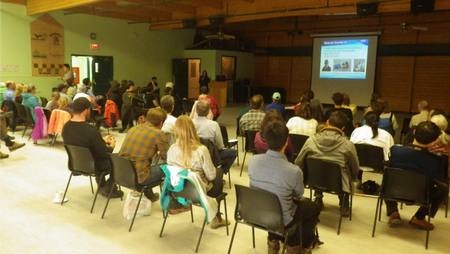A workshop titled “Canada-Japan Future Collaboration Workshop on Arctic Environment based at Canadian High Arctic Research Station (CHARS) Campus” was held on Monday, 1 July 2019 and Tuesday, 2 July 2019, at CHARS, Cambridge Bay, Canada. The goal of the workshop was to deliver and exchange information of on-going and future possible research projects in the Arctic environment surrounding Cambridge Bay、Nunavut with Canadian counterparts and local stakeholders. The meeting was organized in collaboration with Canadian counterparts at Polar Knowledge Canada (POLAR) to strengthen the bilateral research collaboration between Canada and Japan.
The workshop consisted of two types of meeting: 1) a business meeting and 2) a community science meeting. At the business meeting, around 25 researchers participated to discuss on possibilities of collaborations. 12 presentations regarding on-going and future possible research projects were given by both Canadian and Japanese researchers, and after that, participants discussed in small groups to identify feasible collaborative research proposals in the future. CHARS has high level science facility and their possibilities to tests and demonstrate advanced research and technology for the Arctic environment and livelihood.
In the evening of 2 July, the community science meeting was held mainly to deliver information on Japanese research projects to residents of Cambridge Bay and seek their comments. There were around 50 participants including elders and children. The researchers presented their research projects in plain language (i.e. using simple words) and presented using a lot of photos to enable a better understanding. The residents were very receptive and had a lot of questions and opinions. This meeting went better than expected. Some of the community members expressed their consideration to take necessary actions by themselves to address the changing environment, which might include collaboration with Japanese with their research projects.
As there are people living in the Arctic region, unlike the Antarctic, it is essential to proceed with research activities taking into consideration local residents opinion and in collaboration with local organizations. Thanks to great assistance of Polar, an organization operating CHARS, the workshop was successively held with a lot of participation and interest by the residents of Cambridge Bay. The local municipal government, community politicians, and local knowledge leaders joined the business meeting and showed high interest on scientific collaboration of Japan and Canada. They were interested in finding ways to bridge state-of-art science and technology with Indigenous Knowledge (IK), We hope this would lead to further progress in research activities in the Canadian Arctic.
Hiroyuki Enomoto (NIPR)






